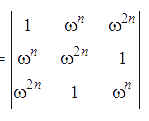Let ω≠1 be cube root of unity and S be the set of all non-singular matrices of the form [1abω1cω2ω1],where each of a,b,andc is either ωorω2. Then the number of distinct matrices in the set S is a. 2 b. 6 c. 4 d. 8
2
6
4
8
The correct Answer is:A
To solve the problem, we need to determine the number of distinct non-singular matrices of the form:
⎡⎢⎣1abω1cω2ω1⎤⎥⎦
where a,b,c can each be either ω or ω2, and ω is a cube root of unity (i.e., ω3=1 and ω≠1).
Step 1: Calculate the Determinant
The determinant of the matrix can be computed using the formula for the determinant of a 3x3 matrix:
det(A)=1⋅∣∣∣1cω1∣∣∣−a⋅∣∣∣ωcω21∣∣∣+b⋅∣∣∣ω1ω2ω∣∣∣
Calculating these 2x2 determinants:
1. ∣∣∣1cω1∣∣∣=1⋅1−c⋅ω=1−cω
2. ∣∣∣ωcω21∣∣∣=ω⋅1−c⋅ω2=ω−cω2
3. ∣∣∣ω1ω2ω∣∣∣=ω⋅ω−1⋅ω2=ω2−ω2=0
Putting it all together, we have:
det(A)=1−cω−a(ω−cω2)+b⋅0
This simplifies to:
det(A)=1−cω−aω+acω2
Step 2: Set the Determinant Not Equal to Zero
For the matrix to be non-singular, we require:
1−cω−aω+acω2≠0
Step 3: Analyze Possible Values for a,b,c
Each of a,b,c can be either ω or ω2. Therefore, we have:
- a can take 2 values: ω or ω2
- b can take 2 values: ω or ω2
- c can take 2 values: ω or ω2
This gives us a total of 2×2×2=8 combinations of (a,b,c).
Step 4: Check Non-Singularity for Each Combination
Now we need to check which combinations yield a non-zero determinant.
1. If a=ω and c=ω:
det(A)=1−ω2−ω+ω2⋅ω2=1−ω−ω2+1=2−(ω+ω2)=2−1=1≠0
2. If a=ω and c=ω2:
det(A)=1−ω3−ω+ω2⋅ω2=1−1−ω+1=1−ω≠0
3. If a=ω2 and c=ω:
det(A)=1−ω2−ω2+ω2⋅ω=1−2ω2+ω2=1−ω2≠0
4. If a=ω2 and c=ω2:
det(A)=1−ω2−ω2+ω2⋅ω2=1−2ω2+1=2−2ω2≠0
Conclusion
After checking all combinations, we find that all combinations yield a non-zero determinant. Thus, all 8 combinations are valid.
Final Answer
The number of distinct non-singular matrices in the set S is:
d. 8
The determinant of the matrix can be computed using the formula for the determinant of a 3x3 matrix:
For the matrix to be non-singular, we require:
Each of a,b,c can be either ω or ω2. Therefore, we have:
- b can take 2 values: ω or ω2
- c can take 2 values: ω or ω2
Now we need to check which combinations yield a non-zero determinant.
det(A)=1−ω2−ω+ω2⋅ω2=1−ω−ω2+1=2−(ω+ω2)=2−1=1≠0
det(A)=1−ω3−ω+ω2⋅ω2=1−1−ω+1=1−ω≠0
det(A)=1−ω2−ω2+ω2⋅ω=1−2ω2+ω2=1−ω2≠0
det(A)=1−ω2−ω2+ω2⋅ω2=1−2ω2+1=2−2ω2≠0
After checking all combinations, we find that all combinations yield a non-zero determinant. Thus, all 8 combinations are valid.
The number of distinct non-singular matrices in the set S is:
Topper's Solved these Questions
- BOOK - CENGAGE ENGLISHCHAPTER - MATRICESEXERCISE - Single correct Answer34videos
MATRICES
- BOOK - CENGAGE ENGLISHCHAPTER - MATRICESEXERCISE - Archives (Single correct Answer type)11videos
MATRICES
- BOOK - CENGAGE ENGLISHCHAPTER - MATHMETICAL REASONINGEXERCISE - Archives10videos
MATHMETICAL REASONING
- BOOK - CENGAGE ENGLISHCHAPTER - METHODS OF DIFFERENTIATIONEXERCISE - Single Correct Answer Type46videos
METHODS OF DIFFERENTIATION
Similar Questions
Let ω≠1 be cube root of unity and S be the set of all non-singular matrices of the form ⎡⎢⎣1abω1cω2ω1⎤⎥⎦, where each of a,b,andc is either ω or ω2. Then the number of distinct matrices in the set S is (a) 2 (b) 6 (c) 4 (d) 8
View SolutionIf ω is a cube root of unity, then
1+ω2= …..View SolutionIf ω is a cube root of unity, then find the value of the following: (1+ω−ω2)(1−ω+ω2)
View SolutionWith 1,ω,ω2 as cube roots of unity, inverse of which of the following matrices exists?
View SolutionIf ω is a cube root of unity, then find the value of the following: (1−ω)(1−ω2)(1−ω4)(1−ω8)
View SolutionIf ω≠1 is a cube root of unity and a+b=21, a3+b3=105, then the value of (aω2+bω)(aω+bω2) is be equal to
View SolutionIf ω is a cube root of unity and (1+ω)7=A+Bω then find the values of AandB
View SolutionIf ω is a complex cube roots of unity, then find the value of the (1+ω)(1+ω2)(1+ω4)(1+ω8)… to 2n factors.
View SolutionIf 1,ω,ω2 are the cube roots of unity, then △

is equal to.....View SolutionIf ω is a cube root of unity but not equal to 1, then minimum value of ∣∣a+bω+cω2∣∣, (where a,b and c are integers but not all equal ), is
View Solution

